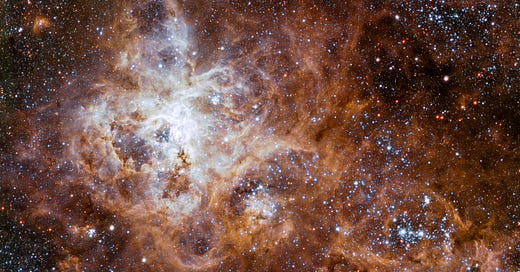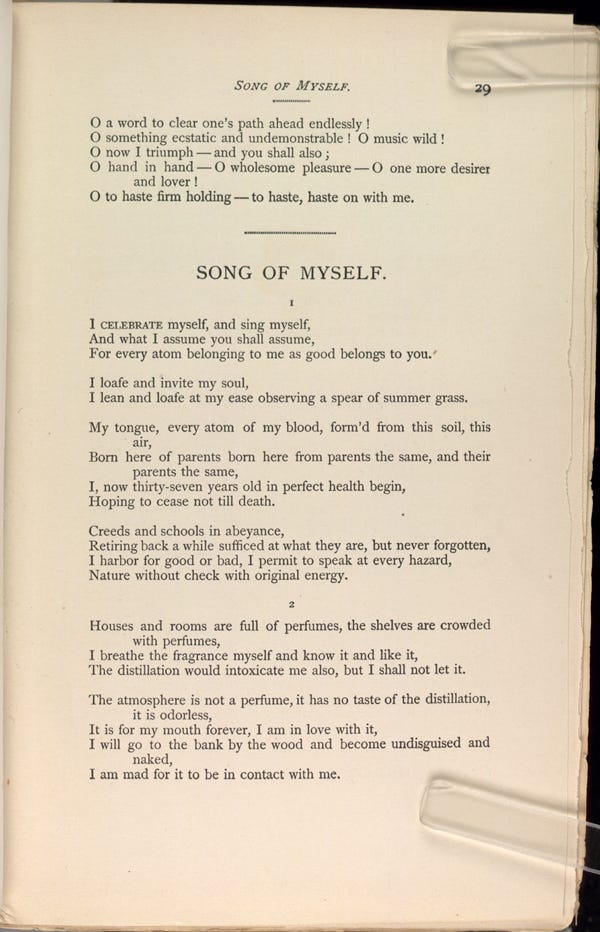here is what the stars smell like.
“If you want to make an apple pie from scratch, first you must create the universe.”
dear little voice,
here is what the stars smell like:
they are more of a texture than a scent, of course, because stars are primarily made of two substances that do not have scents of their own: hydrogen, and helium. hydrogen creates light from within, and helium: expansion. so, we can deduce that stars smell of light and expansion.
light, though, we know, has no smell, but does make the air waiver and handsewn, it catches and floods the day, and soaks it in blossomfoam, it enters as a bird in flight, and so all other smells of stars must be layered upon the wing of light.
expanding also does not have a smell but instead a feeling. we feel expanding when we turn inside out with love. yes, expanding has no smell but instead a feeling: the stone that turns over inside of you when someone you have missed for a very long time kisses the back of your left knee.
light is the curve of a cloud, and the path of the wind. it makes the sound that leaves do when they shift against the sidewalk. expansion is a stone damp in the earth that seems to be breathing with every creature that has ever felt one inside of them: a graveyard and a nursery at once.
so we can deduce, little voice, that stars smell of a pigeon’s ruffled wing, blossom foam, and wet stones. like spring, only more so. like gold, only less so.
I don’t know how I know this is true, but I know it is true.
and it is true that you contain these things also, little voice. the universe was kind enough, as we know, to quietly explode in order to ensure that you exist. you: “a universe of atoms… an atom in the universe”.
i will tell you the story.
little voice, our sun is very, very young. just like you. she is also a star, but even more gold, and even more hot- so, most likely she smells instead of a dove’s wing and a very, very wet stone. a long time ago, great, high-mass stars just like our Sun threw back their heads and laughed and exploded across the galaxy in a cosmic shimmy from head to toe, babbling and strewing themselves all about, and enriching the milky way with the very chemistry of life. the very molecules of the calcium composing your bones, the iron running through your veins, and the nitrogen that pulses about your heart trace directly back to these crucibles of light. you are, simply, a little star with a little voice. you are this cosmic dance.
As the beautiful Carl Sagan put it in The Cosmic Connection:
““The fate of individual human beings may not now be connected in a deep way with the rest of the universe, but the matter out of which each of us is made is intimately tied to the processes that occurred immense intervals of time and enormous distances in space away from us….all of the rocky and metallic material we stand on, the iron in our blood, the calcium in our teeth, the carbon in our genes were produced billions of years ago in the interior of a red giant star. We are made of starstuff.”
Carl Sagan.
little voice: you are not a cosmic orphan. all of it: the silver dust circling the Moon, the lint on your windowsill, the Mona Lisa, every photograph of her and each the nail in the wall, every discarded napkin, every note left in a lunchbox, the belly of every pink sunset that has ever lipped every cloud, every grain of sand and every star, every butterfly and every blackhole, every sun in your eye, every preacher, and the crust of every apple pie, every wet autumn, the first twig of every great fire, every flower Ophelia placed in the lake, every page that forgot her, the scale of every eyelash that has tickled your every cheek, every roman’s transluscent fingernail, every fleck of gold that Gustav Klimt painted into The Kiss, every two hands that, in front of it, were warm touching, every heavy tomato, the blunt of every sword in every crusade, every person who has ever cried in the dark and the wetness of every tear, the whisp of hair on every toe in every first step into the sun, every fleshy finger that was there to catch them, every gasp in a dream, every bird on a wire, every ladybird’s left toe: all of it, all of it was accidentally nudged into being 13.8 billion years ago from a Single Star, with a bang no louder than the first note of Beethoven’s fifth symphony, and no larger than the treble clef, and the stars saw it all, all of it, and every time you were illumined by a steady radiance, by a wonder with a source beyond all reason, deluded by necessity to the mundane miraculousness of it all, the flights and figments of reality, the axonal tremor of your dreams that come from it: that came from the same place, too.
so when you look up one night after being fretted by the trifles of the day that you will live out in this sliver of spacetime allotted to you by sheer chance, for a moment, you might just glimpse yourself and your world islanded in this stream of stars and light expanding: you, a pilgrim of mortality, voyaging between horizons across eternal seas of space and time, forever, utterly stricken, stricken by the sheer everythingness of everything conspiring with the everythingness of everything else.
“Mingle the starlight with your lives, and you won’t be fretted by trifles.”
Maria Mitchell, the first female astronomist.
and still we argue about who’s in charge of it all. we keep secrets, we slam doors, we sigh at the rain, at a glance, and, often, in the mirror.
little voice, you are not the centre of things and perhaps this makes you feel quite small. you are not the universe. but you are in and of it, bumbling about curious and laughing and blushing and devastated, with so much you know and so much you do not, holding on tight as we hurtle through space in one great cosmic ricochet. don’t forget to look up. there is so much to see and so much to know. that makes me smile, little voice. that makes me feel quite large. where will you begin?
“Every atom belonging to me as good belongs to you”
Song of Myself, Walt Whitman.
to be a person in the world is to live between the scale of being a little voice and a little star; between the scale of butterflies and black holes. there are two sensible responses to this: to laugh, and to cry.
you can cry, little voice, because we are still arguing over who is in charge of it all, because none of it is important, because you stepped in a puddle in your New Shoes, because sometimes you lie awake in the dark, because sometimes you dream, because people, still, keep secrets, because sometimes we try to write it down, because sometimes we are too sentimental, because we cannot begin to fathom how beautiful it all is and we only will when it is too late.
and you can laugh, little voice, because we are still arguing over who is in charge of it all, because none of it is important, because you stepped in a puddle in your New Shoes, because sometimes you lie awake in the dark, because sometimes you dream, because people, still, keep secrets, because sometimes we try to write it down, because sometimes we are too sentimental, because we cannot begin to fathom how beautiful it all is and we only will when it is too late.
your greatest limitation, little voice, is not your size, but your perspective. we are a blinkered species. our lens is too easily contracted by the fleeting urgencies of our own little human lives that seem so colossal consciously, and so feeble atomically, and so blurred easily by the hopes and fears of our little, little days.
and at those times when that hope is too big of a thing to have, and it is confusing to straddle laughter and tears, it can be a very sensible thing to simply take wonder- even small- as a good enough placeholder.
“Wonder,” Diane Ackerman observed at her performance at Maria Popova’s The Universe in Verse, “is the heaviest element in the periodic table of the heart. Even a tiny piece of it can stop time.”:
“A sense of wonder can find you in many forms, sometimes loudly, sometimes as a whispering, sometimes even hiding inside other feelings — being in love, or unbalanced, or blue.
For me, it is looking at the night for so long that my eyes ache and I’m stuck seeing stars for hours afterwards, watching the way the ocean sways itself to sleep, or as the sky washes itself in colors for which I know I will never have the words — a world made from layers of rock and fossil and glittered imaginings that keeps tripping me up, demanding I pay attention to one leaf at a time, ensuring I can never pick up quite where I left off.”
Diane Ackerman.
Pale Blue Dot: a photograph of Earth taken Feb. 14, 1990, by NASA’s Voyager 1 at a distance of 3.7 billion miles (6 billion kilometers) from the Sun.
”That’s here. That’s home. That’s you.”
and in the end, little voice, you’re so small that you might as well be extraordinary. you: spring, you: pigeon’s wing, you: blossomfoam, wet stone, wonderful, very, very, little thing.
love,
ars poetica.
little voice: it is my belief that Poetry is a human birthright. my work will always be completely free, and takes considerable Time and Love to give to you several days a week. if it has brought you Joy, consider buying me a book so that I may continue to tuck Words in your pocket:
Stars -- Such a plaintive, farewell hissing they made, like diamonds imbedded in the blue-black breast of forever.”
Tess Gallagher, from “Laughter and Stars,”









I'm not crying, you're crying.
I think this piece changed my life. Thank you.